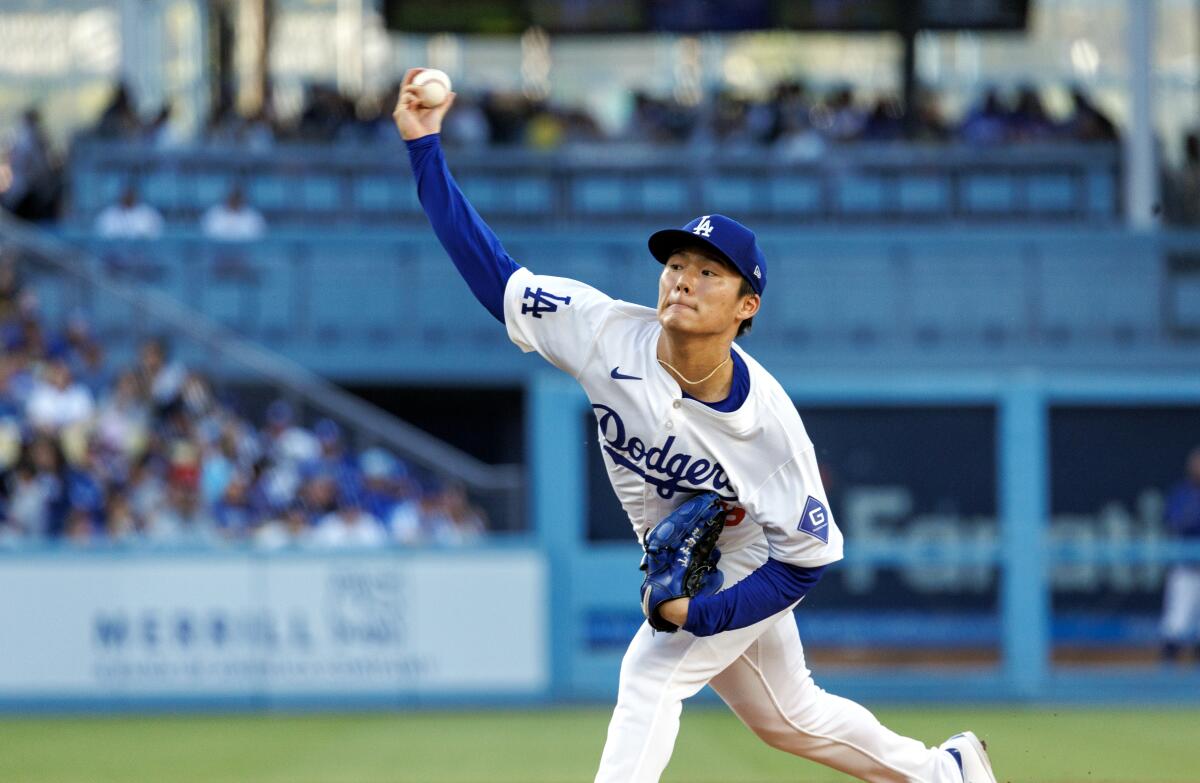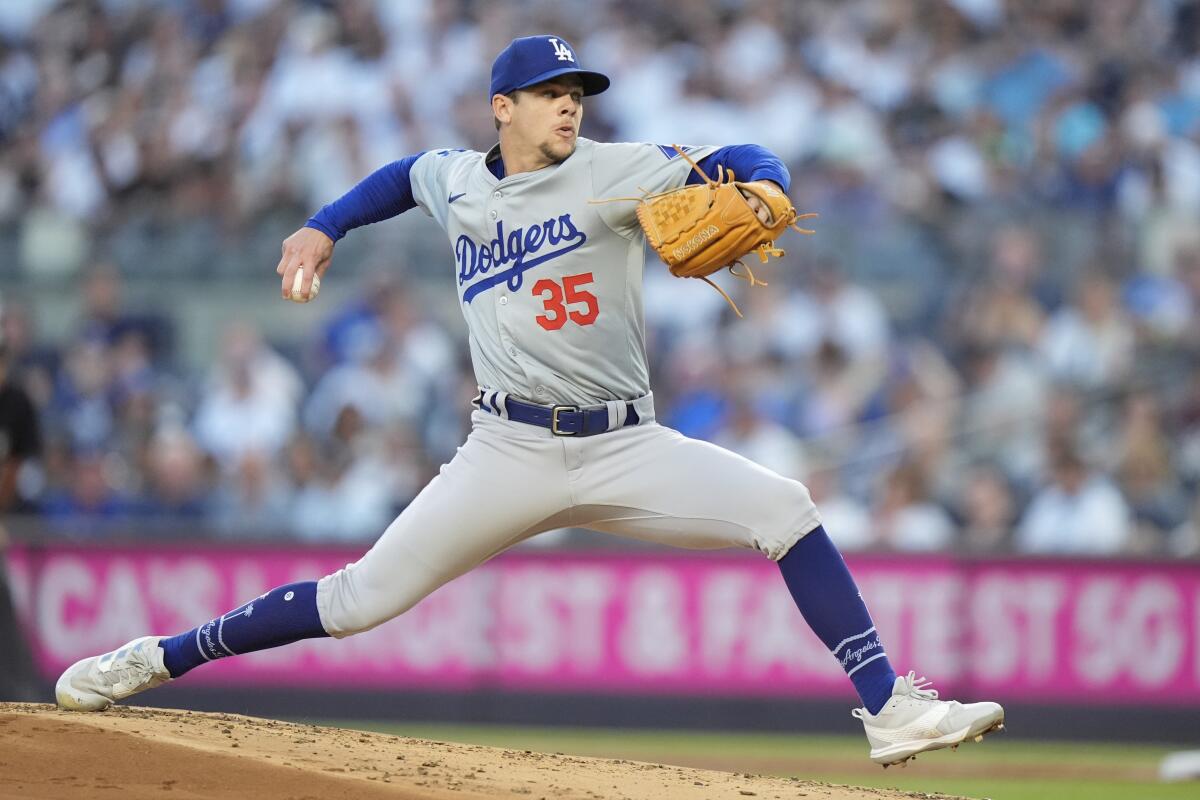In the wake of Yoshinobu Yamamoto’s shoulder injury last week, the Dodgers didn’t feel the need to identify a new No. 2 starter.
They weren’t necessarily counting on someone else in their rotation to elevate their game.
“These [other] starters,” manager Dave Roberts said, “just need to go out there and be themselves.”
Still, recent history suggests the Dodgers will, at some point, need someone to fill Yamamoto’s role near the top of the rotation. Few teams can succeed in the playoffs without at least a couple of legitimate frontline options. Too often in their recent October failures, the Dodgers have been short on elite-level pitching.
This week, the team got a look at their best internal choices to handle such a task.
And on Thursday, in a 5-3 win over the Colorado Rockies, Gavin Stone showed glimpses of the dominance that could make him their best current alternative.
Stone’s final line Thursday — in a game the Dodgers got home runs from Shohei Ohtani, Will Smith and Freddie Freeman, plus three hits from Teoscar Hernández — wasn’t overwhelming.
He pitched 5 ⅓ innings. He gave up two runs. Both scored after he left the game in a bases-loaded jam in the sixth.
Over the first five innings, though, Stone again flashed his continued newfound dominance, further fueling his status as a potential frontline weapon.
“I think for any starting pitcher, you just evaluate: Do they have the weapons to get left out, to get right out, to be efficient, to command the baseball, to get a strikeout when you need to, and can you navigate three times through the lineup,” Roberts said. “He’s checked all those boxes, and for me, he’s only getting better.”
When Yamamoto went down last weekend — his rotator cuff strain isn’t expected to end his season, but leaves his ability to be an ace-caliber weapon in doubt for the time being — there were immediate questions about what it would mean for the Dodgers’ long-term pitching plans.
Their rotation was still headlined by Tyler Glasnow, an early-season Cy Young contender with a 3.00 ERA and MLB-leading 125 strikeouts.

Dodgers starting pitcher Yoshinobu Yamamoto delivers against the Kansas City Royals on June 15.
(Gina Ferazzi / Los Angeles Times)
But beyond that, it was unclear who could emerge as a true No. 2 option — in the event Yamamoto doesn’t regain form (or health) before the end of the season.
Walker Buehler, the club’s former ace, was struggling in his return from Tommy John surgery, even before landing on the injured list with a hip injury. Bobby Miller, a playoff starter as a rookie for the Dodgers last year, had his season sidetracked by a shoulder injury, then gave up five runs in his return to the rotation Wednesday.
Clayton Kershaw is nearing his own return, remaining on track for a late July/early August activation after pitching three innings with single-A Rancho Cucamonga on a rehab assignment Wednesday.
“He has blown through this,” Roberts said of Kershaw. “I hope it continues.”
But relying on a 36-year-old veteran coming off his first career surgery represented a risky proposition.
The early outlook on a relatively weak trade market for starting pitchers doesn’t provide many obvious external targets, either.
That’s why Stone’s ascension has been so welcome, giving the Dodgers not just another productive regular-season pitcher, but one who has increasingly flashed October-worthy stuff in the process.
An All-Star selection might not be out of the question, either.
“I wouldn’t have bet on it coming into the season,” Roberts said. “But the way it has played out for three months, if that happened, man, it would certainly be well-deserved.”
Indeed, in 14 starts this season, Stone now has a 3.04 ERA, 13th-best in the National League. He has eight wins, trailing only Luis Gil of the New York Yankees for the MLB rookie lead.
Even if the Dodgers insisted they didn’t need one, he is blossoming as their best option to replace Yamamoto in the hierarchy of the rotation.

Gavin Stone delivers against the New York Yankees on June 8.
(Frank Franklin II / Associated Press)
“He’s just kind of becoming one of those guys,” Freeman said, “where you are having a good chance to win every chance he’s out there.”
On Thursday, the 25-year-old wasn’t impacted by the mile-high altitude, slightly altering his typically sinker-heavy pitch mix by going with more of a four-seam/changeup combination.
Up until the sixth inning, he rarely faced stress on the bases, retiring 12 of his first 14 batters before stranding a pair of runners in the fifth.
“The first five innings, I thought the command was unbelievable,” Roberts said.
Stone eventually exited after issuing two walks and a single in the sixth, when Roberts felt he “sort of hit a wall” at hitter-friendly (and high altitude) Coors Field.
However, the outing was also Stone’s fourth in his last five starts with at least six strikeouts — he hadn’t done so previously since his season debut in late March — a promising sign for a pitcher whose success was once dependent on limiting contact.
“It’s probably just the work [pitching coaches] Connor [McGuiness], Mark [Prior] and I have put in during bullpens and stuff,” Stone said of his growing swing-and-miss capabilities. “Just executing certain pitches a little bit better.”
His ability to complement a trademark changeup with sliders, cutters and sinkers continues to be a boon, as well, alleviating the issues he faced in an up-and-down debut season last year when he largely relied on just three pitches.
“I think that last year he was searching, looking — finding himself in the big leagues,” Roberts said, reflecting back on Stone’s 9.00 ERA in 2023. “This spring, he just had a different demeanor about him. And it has definitely carried into the season.”
There are still myriad boxes for Stone to check between now and the playoffs. Many steps ahead him on the path to October success.
Nonetheless, his production has been a blessing for the Dodgers’ banged-up pitching staff.
Unless Yamamoto returns at full strength, someone will need to bolster the club’s rotation.
And of all the options available at this point, Stone is looking like perhaps their best bet.





